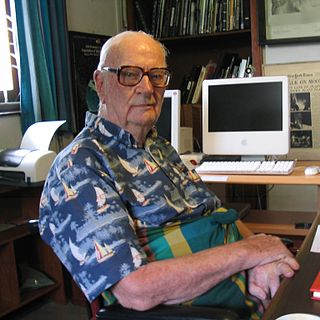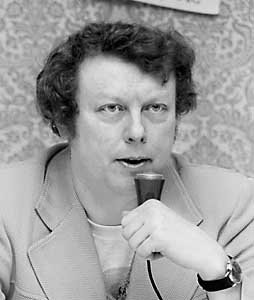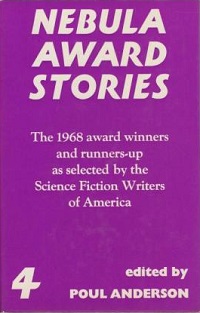
Hard science fiction is a category of science fiction characterized by concern for scientific accuracy and logic. The term was first used in print in 1957 by P. Schuyler Miller in a review of John W. Campbell's Islands of Space in the November issue of Astounding Science Fiction. The complementary term soft science fiction, formed by analogy to hard science fiction, first appeared in the late 1970s. The term is formed by analogy to the popular distinction between the "hard" (natural) and "soft" (social) sciences, although there are examples generally considered as "hard" SF, such as Isaac Asimov's Foundation series, built on mathematical sociology. Science fiction critic Gary Westfahl argues that neither term is part of a rigorous taxonomy; instead they are approximate ways of characterizing stories that reviewers and commentators have found useful.

Harry Clement Stubbs, better known by the pen name Hal Clement, was an American science fiction writer and a leader of the hard science fiction subgenre. He also painted astronomically oriented artworks under the name George Richard.

John Wood Campbell Jr. was an American science fiction writer and editor. He was editor of Astounding Science Fiction from late 1937 until his death and was part of the Golden Age of Science Fiction. Campbell wrote super-science space opera under his own name and stories under his primary pseudonym, Don A. Stuart. Campbell also used the pen names Karl Van Kampen and Arthur McCann. His novella Who Goes There? was adapted as the films The Thing from Another World (1951), The Thing (1982), and The Thing (2011).

Poul William Anderson was an American science fiction author from the 1940s until the 21st century. Anderson wrote fantasy novels, historical novels, and short stories. His awards include seven Hugo Awards and three Nebula Awards.

Gordon Rupert Dickson was a Canadian-American science fiction writer. He was inducted into the Science Fiction and Fantasy Hall of Fame in 2000.
The first Golden Age of Science Fiction, often recognized in the United States as the period from 1938 to 1946, was an era during which the science fiction genre gained wide public attention and many classic science fiction stories were published. In the history of science fiction, the Golden Age follows the "pulp era" of the 1920s and 1930s, and precedes New Wave science fiction of the 1960s and 1970s. The 1950s are a transitional period in this scheme; however, Robert Silverberg, who came of age in the 1950s, saw that decade as the true Golden Age.
The 19th World Science Fiction Convention (Worldcon), also known as Seacon, was held on 2–4 September 1961 at the Hyatt House Hotel in Seattle, Washington, United States.

Sucker Bait is a science fiction novella by American writer Isaac Asimov. It was first serialized in the February and March 1954 issues of Astounding Science Fiction, and reprinted in the 1955 collection The Martian Way and Other Stories. It has also been adapted as an episode of the BBC anthology television series Out of the Unknown.

The Psychotechnic League is a future history created by American science fiction writer Poul Anderson. The name "Psychotechnic League" was coined by Sandra Miesel in the early 1980s, to capitalize on Anderson's better-known Polesotechnic League future history. Anderson published 21 novels, novellas and short stories set in this future between 1949 and 1957, with a 22nd published in 1968.
The 17th World Science Fiction Convention (Worldcon), also known as Detention, was held on 4–7 September 1959 at the Pick Fort Shelby Hotel in Detroit, Michigan, United States.

Astounding: John W. Campbell Memorial Anthology is a 1973 anthology honoring American science fiction and fantasy editor John W. Campbell, in the form of an anthology of short stories by various science fiction authors, edited by Harry Harrison. It was first published in hardcover by Random House as a selection of the Science Fiction Book Club, and first published in paperback by Ballantine Books.

Year's Best Science Fiction Novels: 1952 is a 1952 anthology of science fiction novels and novellas edited by E. F. Bleiler and T. E. Dikty. An abridged edition was published in the UK by Grayson in 1954 under the title The Year's Best Science Fiction Novels. The stories had originally appeared in 1951 in the magazines Astounding, Super Science Stories and Two Complete Science-Adventure Books.

The Best of Poul Anderson is a collection of writings by American science fiction and fantasy author Poul Anderson, first published in paperback by Pocket Books in August 1976. It was reprinted in August 1979. The pieces were originally published between 1953 and 1970 in the magazines Astounding Science Fiction, Analog, Galaxy Magazine, and The Magazine of Fantasy and Science Fiction, and the anthology The Farthest Reaches.

The Many Worlds of Poul Anderson is a collection of science fiction short stories by American writer Poul Anderson, edited by Roger Elwood, first published in hardcover by Chilton in June 1974. A paperback edition retitled The Book of Poul Anderson followed from DAW Books in June 1975, and was reprinted in June 1978, December 1978, and October 1983. Most of the pieces were originally published between 1947 and 1971 in the magazines Astounding Science Fiction, The Magazine of Fantasy and Science Fiction, Analog, Riverside Quarterly, and Other Worlds Science Stories. The others are original to the collection.

Nebula Awards 33 is an anthology of science fiction short works edited by Connie Willis. It was first published in hardcover and trade paperback by Harcourt Brace in April 1999.

Nebula Award Stories 4 is an anthology of award-winning science fiction short works edited by Poul Anderson. It was first published in the United Kingdom in hardcover by Gollancz in November 1969. The first American edition was published by Doubleday in December of the same year. Paperback editions followed from Pocket Books in the U.S. in January 1971, and Panther in the U.K. in December 1971. The American editions bore the variant title Nebula Award Stories Four.

The Analog Anthology #1 is an anthology of science fiction stories and articles drawn from Analog magazine over its first fifty years of publication, edited by then-current Analog editor Stanley Schmidt. It was first published in paperback by Davis Publications in December 1980, and reprinted under the alternate title Fifty Years of the Best Science Fiction from Analog in 1982. A hardcover edition was issued under the alternate title Analog’s Golden Anniversary Anthology in 1981.

The Best of Lester del Rey is a collection of science fiction short stories by American author Lester del Rey. It was first published in paperback by Del Rey/Ballantine in September 1978 as a volume in its Classic Library of Science Fiction, with a Science Fiction Book Club hardcover edition following in December of the same year. It was reprinted by Del Rey Books in March 1986, February 1995, and June 2000. The book has been translated into German.

The Best of Raymond Z. Gallun is a collection of science fiction short stories by American author Raymond Z. Gallun, edited by J. J. Pierce. It was first published in paperback by Del Rey/Ballantine in August 1978 as a volume in its Classic Library of Science Fiction.

The Best of John W. Campbell is the title of two collections of science fiction short stories by American author John W. Campbell. The first, a British edition edited by George Hay, was first published in hardcover by Sidgwick & Jackson in February 1973, and in paperback by Sphere Books in November 1976. Sidgwick & Jackson later gathered together with The Far-Out Worlds of A. E. van Vogt (1968) into the omnibus volume Science Fiction Special 15 (1975), and with Brian N. Ball's Singularity Station (1973) and Poul Anderson's Orbit Unlimited (1961) into the omnibus volume Science Fiction Special 20 (1977). The second collection of this title, an American edition edited by Lester del Rey, was first published in hardcover by Nelson Doubleday in May 1976, and in paperback by Ballantine Books in June 1976 as a volume in its Classic Library of Science Fiction. The American edition was reprinted by Del Rey/Ballantine in February 1995, and has also been translated into German.
















